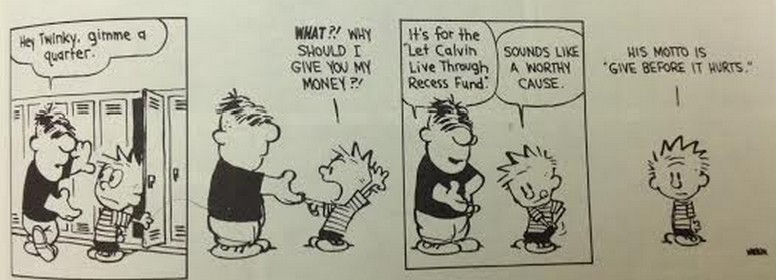Edumacation with Calvin and Hobbes: Calvin’s Tuition

Written by ELI FLESCH
About two weeks ago, the UC Board of Regents decided in a 7-2 vote to increase tuition across the University of California (UC) system. This vote marked a showdown between the UC and state legislature. The tuition raise is a threat to the legislature: increase state funding of UCs or we will put the burden on our students. It’s a “live through recess” way of treating the student.
The issue of funding is central to any discussion concerning higher education. Money may as well be synonymous with practicality. Many of the ideas which I have proposed in past columns could only hope to be achieved through a greater investment in education. But today, we find ourselves in a situation where money is being used to simply keep our current, ailing system afloat, rather than make substantial improvements.
If unremedied, this tuition raise will prevent many potential students from enrolling in the UC system. It will propagate a contemporary trend of increasing inequality that has defined the United States. Still, the raise should not deter families from sending their children to UCs. As the price of college education increases, the demand for a degree is similarly increasing. It is more valuable than ever to attend a four-year institution, even as tuition increases.
Ultimately, these increasing demands amount to a do-or-die situation, similar to Calvin’s: you will pay and you will be better off. Many college brochures tout the “investment” that you make when you enroll in University X. And after that, in smaller font: the price. Even though college is still worth it, many families may view the investment as a risk. When students take out large student loans, it takes them longer to pay off the debt, hindering a family’s ability to foresee the benefit of education.
It’s hard to reconcile this analysis when talking about a public school. When I was a high school senior, cost was how I weighed whether or not to attend a private school. For prospective high school students in 2019, annual fees for a UC may exceed $15,000. And while the UC argues that most students do not pay in full, there is still the issue of financial aid. Currently, financial aid (like the Cal Grant) is subsidized through taxpayer money. In effect, the regents have control over the demand for financial aid as well as tuition.
Between the arguments over inequality and price is the inclusivity debate. The UC says tuition will be used to accommodate for a larger student population. This position has its merits. Despite the negative connotations associated with a bigger student body, there are creative ways to ensure each student learns. But what kinds of students would we be welcoming in? Under the raise – only students who could afford to pay. Notwithstanding scholarships and grants, the economic diversity of UC campuses would decrease.
While the UC should not have raised tuition in the first place, I hope the state will match the raise with funding. Ideally, the state would have been first to act. As a result of the raise, everybody is politically stunted. If the state decides to remain silent, the UC system will continue to be demonized, and rightfully so. If they do match funding, it gives the UC too much bargaining power on the issue of state funding.
The effects of this raise will be felt in the long-term. A healthy economy is built on spending. Millennials are already having a hard time paying off their loans. And in response, this burgeoning demographic will spend less and less, and take longer to settle down. I have a mixed opinion about the stereotype that millennials are an infantile generation, but it’s easy to see how they may be more dependent on help than past generations.
Students have been very vocal on this issue, which makes me happy, though its easy to see us in Calvin’s position. Like him we are loudmouths, but perhaps more importantly, we are similarly limited in our power. Let’s just hope our “worthy cause” becomes cheaper. Calvin’s ten cents at six is our fifteen-thousand at nineteen.
[Source]: The California Aggie


